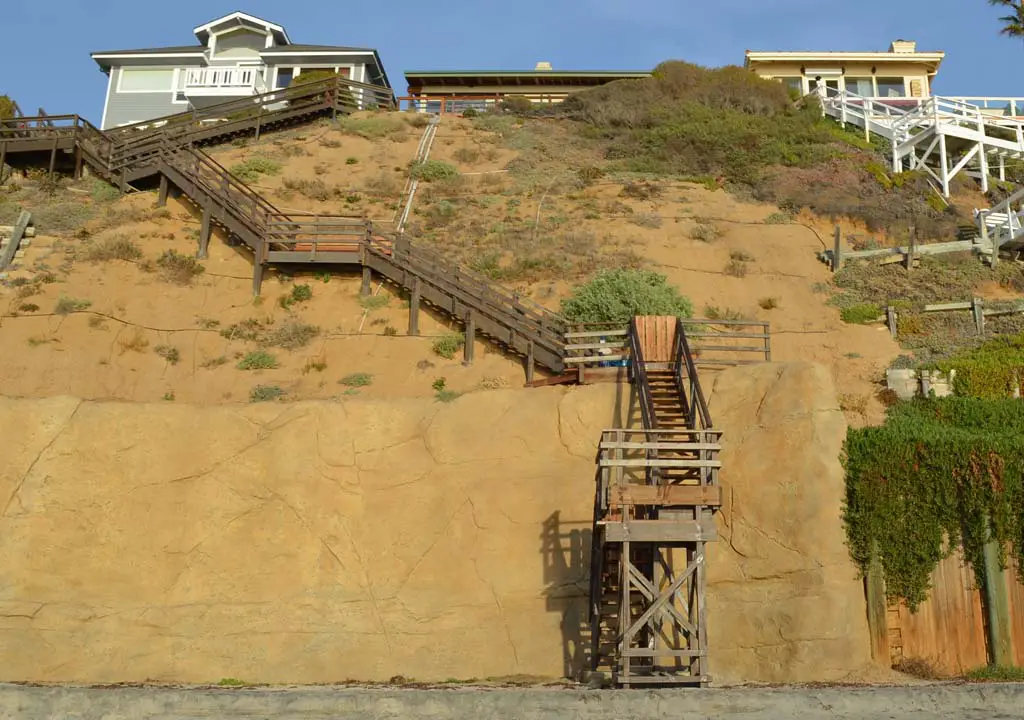ENCINITAS — A state appeals court’s recent ruling upholding the California Coastal Commission’s right to impose time limits on how long two Encinitas families’ private seawalls could be erected could have far-reaching implications for coastal property owners, experts said.
The case has generated much attention as private homeowners throughout the state are at odds with the state’s coastal protection agency’s stance regarding seawalls, which are typically concrete or wooden barriers built at the base of cliffs to stabilize them and protect homes built atop coastal bluffs.
Environmentalists have long pushed for the elimination of private seawalls, which they said adversely affect the health of the coastline by preventing normal wear and tear on coastal bluffs, which replenishes sand.
The Fourth District Court of Appeals, by 2-1 decision, overturned a lower court’s ruling that overturned the state commission’s clause requiring Barbara Lynch and Thomas Frick to reapply for a permit for the seawall for the families’ homes on Neptune Avenue after 20 years.
Superior Court Judge Earl Maas’ original decision also reversed the Commission’s decision to deny the families a permit to reconstruct a private staircase from their properties to the beach below. The appeals court’s decision reverses this, too.
The families were applying for a permit to build a 100-foot-tall, state-of-the-art concrete seawall to replace their aging wooden one and rebuild the private staircase from their homes to the beach below, after storms in 2010 largely wiped out both structures.
The city of Encinitas approved their applications, but the Coastal Commission stepped in and denied the permit for the staircase and would only allow the families to rebuild the wall with the 20-year stipulation, to which the families agreed.
The Coastal Commission has argued that by agreeing to the conditions, the families waived their rights to sue. The families contend they signed the documents under protest and duress, as not signing them would delay the construction of the seawall and put their homes in peril.
“The Commission contends respondents waived any challenge to these conditions by signing and recording documents agreeing to them and then accepting the benefits of the permit by completing their project,” the appeals court wrote in its published opinion. “We agree.”
In regards to the 20-year clause, the appeals court ruled that it was within the commission’s discretion to revisit the need for the seawall and assess the impacts it has on neighboring properties as well as the impacts a potential rise in sea levels would have on the structure.
Additionally, the panel majority argued, the burden was on the families to prove the commission’s clause was unreasonable; otherwise, the commission has broad authority over regulating the structures.
“Respondents have not identified nor have we located any authority categorically precluding the Commission from imposing a condition limiting the duration of a permit,” the opinion states. “To the contrary, the Commission has broad discretion to impose conditions to mitigate the seawall’s impacts.”
In dissent, Judge Gilbert Nares opined that the commission overstepped its boundaries when requiring the 20-year clause, which he said amounted to an illegal state takeaway of private property rights.
“The permit expiration does not mitigate any impacts the seawall may cause in the future. Rather, it merely gives the Commission the option to deny the permit outright in 20 years,” Nares wrote.
Because the opinion is published, it could have far-reaching implications on property owners with private seawalls across the state, because it affirms the commission’s authority and discretion over their approval and conditions of approval.
The families have yet to say whether they will seek review by the State Supreme Court.



1 comment
As clearly shows in the photograph, the stairway that was denied by the Coastal Commission has been reconstructed in violation of the permit for the seawall.
The Commission staff report from the permit hearing in August of 2011 is at:
http://documents.coastal.ca.gov/reports/2011/8/W17b-8-2011.pdf
It has a picture of the damaged stairs before they were rebuilt. Compare that with the new picture.
Comments are closed.